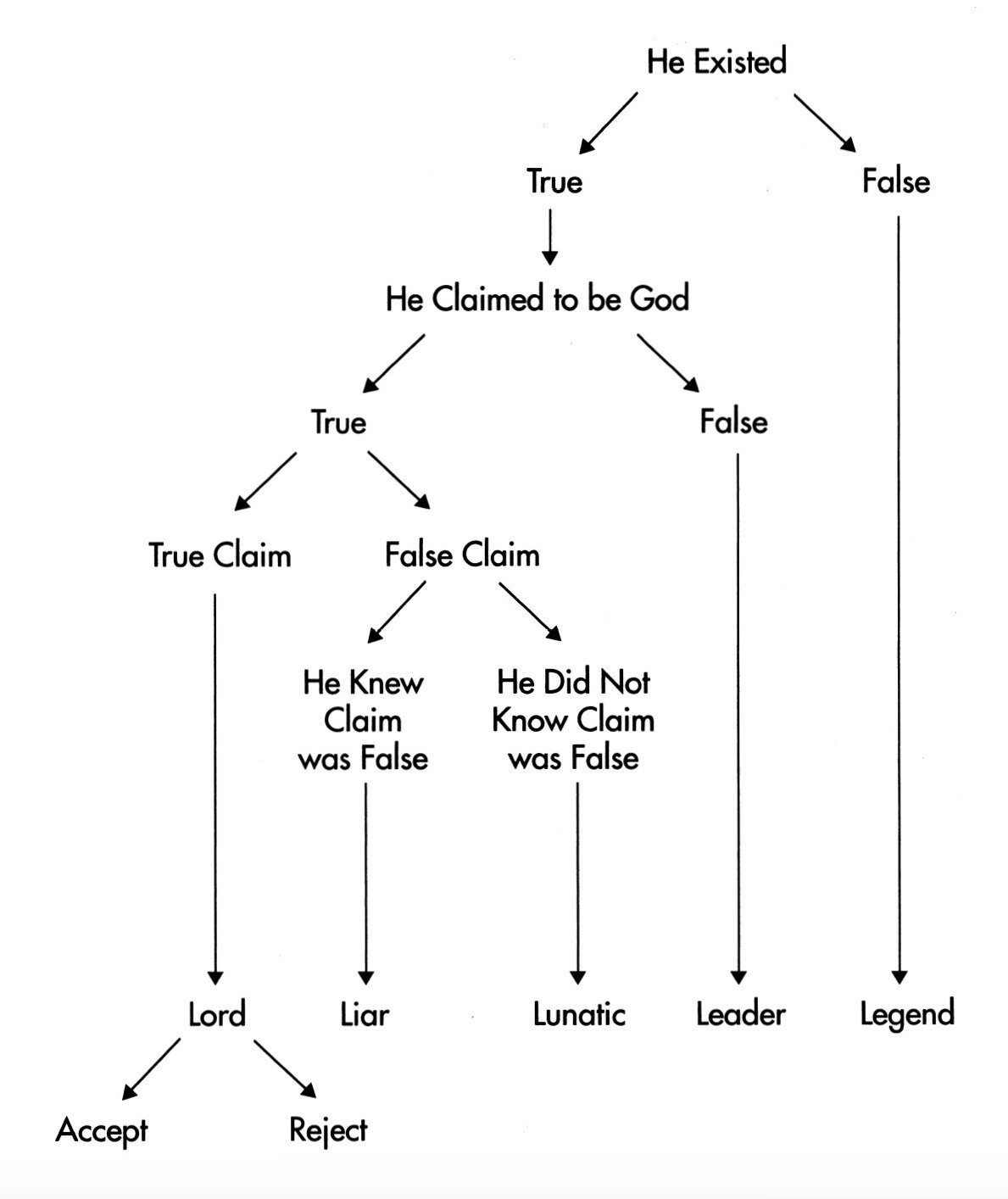Is Jesus God?
Is Jesus God?
If Jesus is not God, He was either a legend, a lunatic, or a liar!
Although this may at first seem like an alarming statement, it’s actually sound reasoning. No one can logically say that Jesus was “just a good man who lived in history.” Why? Because Jesus claimed to be God. Either Jesus is who He claimed to be, or he was a liar. If He is not God, then He deliberately lied and deceived many people… or even deceived Himself! In fact, if Jesus is not God, He’s still deceiving millions of people who stake their eternal destiny on Him. Jesus cannot logically just be a “good man.”
As you study this section, refer to the chart below. It illustrates the different choices people make about Jesus and the logical paths they must follow to reach their conclusions. There are only five logical conclusions a person can arrive at when confronted with the claims Jesus Christ made about Himself.
A. Was JESUS ONLY A LEGEND?
Very few people believe that the life of Jesus is only a legend. There’s just too much evidence for His existence. Although the exact dates of His birth and death are not precisely known, history books accept and record His life as fact. Four authors of New Testament books record the life of Jesus, and many early Christian writings also document His life. Non-Christian writers of the 1st century also mention Jesus. Here are a few examples of evidence from non-Christian writers of the late 1st and early 2nd centuries:
Tacitus
A Roman historian, Tacitus wrote that the citizens suspected Nero of starting the great fire of Rome in AD 64. “To suppress the rumor, he falsely charged with the guilt, and punished with the most exquisite tortures, the persons commonly called Christians… Christus, the founder of the name, was put to death by Pontius Pilate in the reign of Tiberius” (Annals, XV. 44), about 100 AD.
Suetonius
Also a Roman historian, he mentions “followers of Chrestus…” (Life of Claudius, 25.4), about 120 AD. (Chrestus is a different spelling of “Christ.”)
Pliny the Younger
A Roman governor of Bithynia (112 AD), he wrote to the emperor Trajan, saying that he had tried to make Christians bow down to the statue of the emperor Trajan. “And to curse Christ, which a genuine Christian cannot be induced to do… They affirmed… that they were in the habit of meeting on a certain fixed day before it was light, when they sang a hymn to Christ as to a god, and bound themselves to a solemn oath, not to do any wicked deeds, but never to commit any fraud, theft, adultery, never to falsify their word…” (Epistles, X.96).
Josephus Flavius
A Jewish historian, he wrote: “…Jesus, a wise man, if it be lawful to call him a man, for he was a doer of wonderful works, a teacher of such men as received the truth… He drew over to him many of the Jews and many of the Gentiles. He was the Christ, and when Pilate, at the suggestion of the principal men among us, had condemned him to the cross, those who loved him at the first did not forsake him…” (Antiquities, xviii.33), written early in the 2nd century.
Historical evidence overwhelmingly supports the existence of Jesus of Nazareth, a Jew who lived in Israel in the 1st century. In ancient times, even the opponents of Christianity never doubted the historicity of Jesus.
B. Was JESUS ONLY A GREAT HUMAN LEADER?
Some people believe that Jesus was an extraordinary man, a great moral teacher, and human leader who lived a life of selfless service. However, they don’t believe that He really performed miracles, or that He actually claimed to be God.
The biggest problem with this line of thought is that solid evidence shows the biblical documents are very reliable. In addition, the time gap between the life of Jesus and the earliest written New Testament documents is quite short, probably less than 20 years. The Gospels were written within the life span of people who knew and saw Jesus. This includes both believers and unbelievers.
Is it possible that the early Christians could have effectively spread “fake news” about Jesus to so many people who actually saw and knew Him? If Jesus had not claimed to be God, the authors of the gospels would have been accused of lying and putting false words into the mouth of Jesus. However, as far back as we can trace in historical literature, no one ever challenged the claims of Jesus recorded in the gospel record.
Jesus made some radical statements about His own deity. In fact, His claims to be the Messiah (which the skeptics reject) are often interwoven with His great moral and ethical teachings (which skeptical people accept as true and noble sayings). It’s unreasonable to attempt to separate these Scriptures.
Not only did Jesus claim to be God, but the Jewish leaders understood His claim and tried to kill Him for blasphemy. The following passages are examples:
John 5:18 - “Therefore the Jews sought all the more to kill Him, because He . . . said that God was His Father, making Himself equal with God.”
John 8:58-59 - “Jesus said to them, ‘Most assuredly, I say to you, before Abraham was, I AM.’ Then they took up stones to throw at Him; but Jesus hid Himself and went out of the temple…”
Here Jesus not only claimed eternal existence, but He also ascribed to Himself the holy Name of God: “I AM”!John 10:30 - “I and My Father are one.”
After Jesus said this, the Jewish leaders attempted to kill Him. Their explanation: “…because You, being a Man, make Yourself God” (10:33).Matthew 26:63-65 - “The high priest answered and said to Him, ‘I adjure You by the living God that You tell us if You are the Christ, the Son of God.’ Jesus said to him, ‘It is as you said’… Then the high priest tore his clothes, saying, ‘He has spoken blasphemy!’”
Luke 22:70 - “Then they all said, ‘Are You then the Son of God?’ And He said to them, ‘You rightly say that I am.’ ”
John 19:7 - “The Jews answered him [Pilate], ‘We have a law, and according to our law He ought to die, because He made Himself the Son of God.’”
The Gospel biographies document the life of Jesus, and they clearly state that Jesus claimed to be God. Unbelieving Jewish leaders recognized that He claimed to be God. Anyone who believes that Jesus never claimed to be God rejects the historical evidence.
C. Was JESUS WAS DELUDED, AND ONLY THOUGHT HE WAS GOD?
In his book, The Quest for the Historical Jesus (written early in the 20th century), Albert Schweitzer suggested that Jesus truly believed that He was God and the Messiah of Israel. However Schweitzer concluded that Jesus only thought He was God! Many liberal theologians have gone along with this idea. They say Jesus was a good moral teacher, but misguided when He claimed to be God. According to Schweitzer, Jesus didn’t realize His mistake until He was on the cross, and that’s why He cried out, “My God, my God, why have you forsaken Me?”
There are at least two problems with this theory. First, a person who makes false claims to be God is mentally ill. If Jesus suffered from this kind of delusion of grandeur, then He was insane. Some mentally unbalanced people think they’re God, but they exhibit abnormal behavior or symptoms of schizophrenia. Although some of the Jews thought Jesus was insane because of His claims, others realized that His character was not that of a mentally unbalanced person (John 10:19-21). When we read the accounts of the life of Jesus, we find that He was an exceptionally stable and balanced person. Crowds of people followed Him to listen to His teachings. Children were attracted to Him. His life certainly didn’t resemble the behavior patterns of a person who suffered from delusions!
Second, it’s not logical to commit your future and base your life on the teachings of a person you know is seriously misled. If Jesus was mistaken in the area of His deity, perhaps He was confused in other areas of His teaching, too. It just isn’t sensible to follow the teachings of someone you know to be unstable. In fact, those who conclude that Jesus was “sincerely deluded” (in spite of overwhelming evidence to the contrary) should ask if they’re deluded themselves!
D. Was JESUS A LIAR?
Many Jewish leaders, both then and now, say that Jesus purposely led people astray by falsely claiming to be God. In early rabbinic writings they wrote, “On the eve of Passover they hanged Yeshua [Jesus] (of Nazareth)… He hath practiced sorcery and beguiled and led astray Israel” (Babylonia Sanhedrin 43a). The word “sorcerer” probably refers to the Jewish leaders’ charges that Jesus did His miracles by the power of Satan (Matthew 12:24, Mark 3:22, Luke 11:15). The statements that “He led the people astray” likely refer to the fact that Jesus claimed to be God, because you don’t lead people astray when you teach things like “love your neighbor!” The leaders charged that He had deliberately misled people with His false claims of deity (John 19:7).
If the Jewish leaders were right, and Jesus deliberately made false claims of deity, then Jesus was a liar! But if Jesus was a liar, He was a most unusual liar. Consider the following:
Liars usually show a pattern of lying, but Jesus consistently showed a pattern of truth.
Liars are usually selfish and self-serving, but Jesus always served others.
Liars lie to protect themselves, but Jesus did just the opposite.
If Jesus was a liar, He was an incredibly foolish liar, because He died for His “lie”!
Historical evidence shows that Jesus claimed to be God. People who refuse to recognize that are left with only two logical choices: Jesus was either a lunatic or He was a liar. Those who believe that Jesus only thought He was God are forced to conclude that this “great moral teacher” was actually mentally ill.
If Jesus was mentally stable, but deliberately made false claims to be God, we must conclude that He was a liar. And if He was a liar, He was not a good moral leader. If He was a liar, He was not a good man at all, and He led millions of people astray.
In all the evidence that we have of Jesus, He did not exhibit the characteristics of a lunatic or a liar.
E. DID Jesus CLAIM TO BE GOD, AND was HIS CLAIM TRUE?
If you followed the logic and evidence in this section, you’ll agree that the only logical conclusion is that Jesus did claim to be God, and that His claim was true, and He is much, much more than just a great human religious leader! He is God, and He is Lord!
Conclusion
C. S. Lewis was one of the greatest thinkers of our time. In Mere Christianity, he wrote “…the really foolish thing that people often say about Him: ‘I’m ready to accept Jesus as a great moral teacher, but I don’t accept His claim to be God.’ That’s the one thing we must not say. A man who was merely a man, and said the sort of things that Jesus said, would not be a great moral teacher. Either this man was, and is, the Son of God, or else a madman or something worse… but let us not come with any nonsense about His being a great human teacher. He has not left that option open to us… This man we’re talking about either was (and is) just what He said, or else He is a lunatic or something worse. Now it seems obvious to me that He was neither a lunatic nor a fiend, and, consequently, however strange or unlikely it may seem, I have to accept the view that He was, and is, God.”
The evidence in this section should lead an honest observer to the logical conclusion that Jesus is God, and worthy of being called Lord. Once people have recognized that Jesus is God, and that logically He is Lord, however, they must make a final decision. They must decide whether or not to trust in Jesus as their personal Savior, and acknowledge Him as Lord over their lives (see Romans 10:9).









